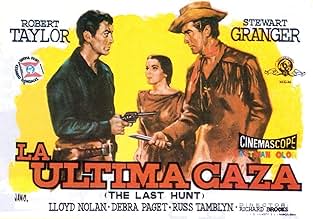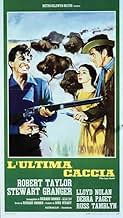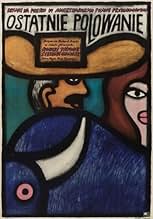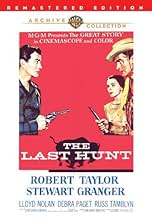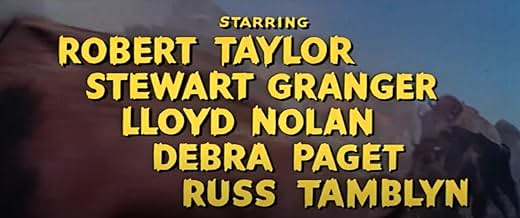In 1883 South Dakota, two buffalo hunters start a personal feud over a captured squaw and a stand-off with a Dakota raiding party over some stolen horses.In 1883 South Dakota, two buffalo hunters start a personal feud over a captured squaw and a stand-off with a Dakota raiding party over some stolen horses.In 1883 South Dakota, two buffalo hunters start a personal feud over a captured squaw and a stand-off with a Dakota raiding party over some stolen horses.
Joe De Santis
- Ed Black
- (as Joe DeSantis)
Roy Barcroft
- Maj. Smith
- (uncredited)
Jimmie Booth
- Barfly
- (uncredited)
Steve Darrell
- Wells Fargo Man
- (uncredited)
Rosemary Johnston
- Woman
- (uncredited)
Casey MacGregor
- Bit Role
- (uncredited)
Jerry Martin
- Barber
- (uncredited)
- Director
- Writers
- All cast & crew
- Production, box office & more at IMDbPro
Featured reviews
7ccbc
I saw this movie (at a drive-in with my family) about the time, or not long after, it came out. I was eleven or twelve. I remembered scenes from this flick for fifty years until seeing it again on TCM. These scenes (a frozen buffalo hide, a guy sharpening a skinning knife, the white buffalo and its hide, and the final unforgettable scene) stayed with me for years. The movie still has power, though not as much as the mental rewrite I gave it over a half century ago threading together the scenes I recalled (nothing about the sex in my pre-adolescent memory). I found the editing and cinematography pretty poor when I looked at it a second time but the story was still good. I recall my father saying after the movie, "I thought Robert Taylor said he wasn't going to do that kind of role any more." I don't know what he meant. This is perhaps Taylor's best movie. He plays a very nasty villain. And maybe that's what my father was talking about. Anyway, a curious and interesting western, exploring themes that western writers had opened up long before but were new to Hollywood. It's too bad that the lead native roles were given to Russ Tamblyn and Debra Paget, but that was 50's Hollywood. Worth watching, but mentally re-edit this film and see if you can't come up with a classic must-see.
The Last Hunt is one of the few westerns ever made to deal with Buffalo hunting, both as a sport and business and as a method of winning the plains Indian wars. Before the white man set foot on the other side of the Mississippi, the plains used to have herds of American Bison as large as some of our largest cities. By the time of the period The Last Hunt is set in, the buffalo had been all but wiped out. The 20th century, due to the efforts of conservationists, saw a revival in population of the species, but not hardly like it once was.
Robert Taylor and Stewart Granger are co-starring in a second film together and this one is far superior to All the Brothers Were Valiant. Here Stewart Granger is the good guy, a world weary buffalo hunter, who has to go back to a job he hates because of financial considerations.
The partner he's chosen to throw in with is Robert Taylor. Forgetting Taylor for the moment, I doubt if there's ever been a meaner, nastier soul than Charlie Gilsen who Taylor portrays. In Devil's Doorway he was an American Indian fighting against the prejudice stirred up by a racist played by Louis Calhern. In The Last Hunt, he's the racist here. He kills both buffalo and Indians for pure pleasure. He kills one Indian family when they steal his mules and takes the widow of one captive. Like some barbarian conqueror he expects the pleasure of Debra Paget's sexual favors. He's actually mad when Paget doesn't see it that way.
No matter how often they refer to Russ Tamblyn as a halfbreed, I was never really convinced he was any part Indian. It's the only weakness I found in The Last Hunt.
However Lloyd Nolan, the grizzled old buffalo skinner Taylor and Granger bring along is just great. Nolan steals every scene he's in with the cast.
For those who like their westerns real, who want to see a side of Robert Taylor never seen on screen, and who don't like cheap heroics, The Last Hunt is the ideal hunt.
Robert Taylor and Stewart Granger are co-starring in a second film together and this one is far superior to All the Brothers Were Valiant. Here Stewart Granger is the good guy, a world weary buffalo hunter, who has to go back to a job he hates because of financial considerations.
The partner he's chosen to throw in with is Robert Taylor. Forgetting Taylor for the moment, I doubt if there's ever been a meaner, nastier soul than Charlie Gilsen who Taylor portrays. In Devil's Doorway he was an American Indian fighting against the prejudice stirred up by a racist played by Louis Calhern. In The Last Hunt, he's the racist here. He kills both buffalo and Indians for pure pleasure. He kills one Indian family when they steal his mules and takes the widow of one captive. Like some barbarian conqueror he expects the pleasure of Debra Paget's sexual favors. He's actually mad when Paget doesn't see it that way.
No matter how often they refer to Russ Tamblyn as a halfbreed, I was never really convinced he was any part Indian. It's the only weakness I found in The Last Hunt.
However Lloyd Nolan, the grizzled old buffalo skinner Taylor and Granger bring along is just great. Nolan steals every scene he's in with the cast.
For those who like their westerns real, who want to see a side of Robert Taylor never seen on screen, and who don't like cheap heroics, The Last Hunt is the ideal hunt.
In 1883, in South Dakota, the former buffalo hunter Sandy McKenzie (Stewart Granger) is tired of hunting the animals. He is approached by Charlie Gilson (Robert Taylor), a man that feels pleasure in killing buffalo and Indians, who proposes a high salary to him to hunt buffalo for him. They associate to each other and hire the skilled skinner Woodfoot (Lloyd Nolan) and the half-breed Jimmy O'Brien (Russ Tamblyn) to help them.
When a group of Indians steal their horses, Charlie hunts them down and kills them in their camp. Charlie finds a gorgeous Indian girl (Debra Paget) with a baby boy and he brings her to his camp to be his woman. However, Sandy and she are attracted to each other but they fear Charlie. Along the days, the tension between them increases until the day Charlie kills a white buffalo that is sacred for the Indians.
"The Last Hunt" is a gritty and brutal western in a period when the Old West is ending. Robert Taylor and Stewart Granger have great performances and Debra Paget is in top of her beauty and responsible for an increasing tension between the two lead characters.
The cruel scenes where the buffalo are killed by marksmen are for real and part of the reduction of the herd planned by the government of USA. My vote is seven.
Title (Brazil): "A Última Caçada" ("The Last Hunt")
When a group of Indians steal their horses, Charlie hunts them down and kills them in their camp. Charlie finds a gorgeous Indian girl (Debra Paget) with a baby boy and he brings her to his camp to be his woman. However, Sandy and she are attracted to each other but they fear Charlie. Along the days, the tension between them increases until the day Charlie kills a white buffalo that is sacred for the Indians.
"The Last Hunt" is a gritty and brutal western in a period when the Old West is ending. Robert Taylor and Stewart Granger have great performances and Debra Paget is in top of her beauty and responsible for an increasing tension between the two lead characters.
The cruel scenes where the buffalo are killed by marksmen are for real and part of the reduction of the herd planned by the government of USA. My vote is seven.
Title (Brazil): "A Última Caçada" ("The Last Hunt")
An intellectual western,focusing on the characters's psychology and well played by Granger and Taylor,with good support from Paget and Tamblyn. It denounces the buffalos slaughter which starved the Indians and lead to their defeat.Taylor's character is a racist,and one of his mates says that it's because he looks like the Indians he hates:he kills the buffalos,he beats women,and he blows his nose with his hands .Another one points out that when you begin to kill,you find pleasure and you are not able to stop anymore.
Not only Richard Brooks denounces the genocide,but he also shows how the White men killed the Indian culture and religion:the white buffalo is a good example.And the ending,with a last picture that packs a real wallop -it could be the picture of a horror movie- ,looks like a divine intervention.
Not only Richard Brooks denounces the genocide,but he also shows how the White men killed the Indian culture and religion:the white buffalo is a good example.And the ending,with a last picture that packs a real wallop -it could be the picture of a horror movie- ,looks like a divine intervention.
10bux
Have no illusions, this IS a morality story. Granger is the troubled ex-buffalo hunter, tempted back to the plains one more time by kill-crazed Taylor. Granger can see the end is near, and feels deeply for the cost of the hunt-on the herds, the Indians and the land itself. Taylor, on the other hand admittedly equates killing buffalo, or Indians to 'being with a woman.' While Granger's role of the tortured hunter is superb, it's Taylor who steals the show, as the demented, immoral 'everyman' out for the fast buck and the goodtimes. There's not a lot of bang-bang here, but the story moves along quickly, and we are treated to a fine character performance by Nolan. The theme of this story is just as poignant today, as in the 1800s-man's relationship to the land and what's on it, and racism. Considering when this was made, the Censors must have been wringing their hankies during the scenes in the 'bawdy house', Taylor's relationship with the squaw, and much of the dialogue. Although downbeat, this is truly a great western picture.
Did you know
- TriviaUS government marksmen shot and killed buffalo during production as part of a scheduled herd-thinning. Close observation of the film reveals that the buffalo were shot in the head, which is why they would fall straight to the ground where they were standing.
- GoofsAll entries contain spoilers
- Quotes
Indian Girl: You take away our food and now you kill our religion.
- ConnectionsFeatured in MGM Parade: Episode #1.20 (1956)
- How long is The Last Hunt?Powered by Alexa
Details
Box office
- Budget
- $2,121,000 (estimated)
- Gross worldwide
- $4,236
- Runtime
- 1h 48m(108 min)
- Aspect ratio
- 2.35 : 1
Contribute to this page
Suggest an edit or add missing content


